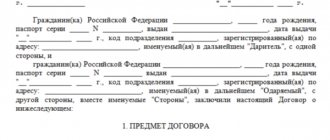Home/Mortgage repayment/Mortgage in case of death of the borrower
Mortgages are provided for a long period of time. During this period, the situation can change significantly. If the mortgage borrower passes away, the debt is not automatically forgiven. The citizen’s family will have to settle the issues with the bank. Individuals may commit to closing the debt or refuse to take action. However, in the latter case, the bank can sell the apartment and use the money to pay off the debt. If the heirs want to receive the mortgaged property after the death of the borrower, they must figure out who the debt will go to and when they should begin paying off the obligations.
Who pays the mortgage in the event of death?
If the main recipient of the mortgage passes away, the first thing you should pay attention to is the presence of insurance that protects life and health. If mortgage insurance is available, the need to cover obligations will be assigned to the insurance company. However, the rules only apply if the relevant risk has been included in the policy. Otherwise, the application for payment will be rejected.
If there is no life insurance policy for a mortgage, or the situation is recognized as not insurable, but there are heirs, the closure of the debt is entrusted to them (Article 1175 of the Civil Code of the Russian Federation). These citizens have the right to refuse to transfer debts. However, in this case the person will have to reject the inheritance completely. Receive property after the death of the mortgage borrower, but the obligation cannot be waived.
If there are several heirs, the mortgage debt in the event of the death of the borrower, like property, is divided between them in proportion to their shares in the inheritance (Article 1175 of the Civil Code of the Russian Federation). It is noteworthy that the person is liable only to the extent of the value of the property received. The bank cannot demand from a citizen an amount exceeding the established parameters.
Attention
However, the responsibility for closing obligations is not always transferred to the heir. If the second responsible party to the agreement is a co-borrower, he will have to begin providing funds (Article 325 of the Civil Code of the Russian Federation). It is not possible to refuse responsibilities.
How does a bank protect its interests?
When applying for a mortgage, the bank assumes that over such a long period the death of the borrower may occur. Of course, the lender will be able to compensate for the losses after the sale of the pledged property. But this is a lengthy process that involves the judiciary, the executive service, and stock exchanges.
Lender banks, in the event of the death of a mortgage borrower, provide for a number of actions to protect financial interests:
- Attracting co-borrowers and guarantors. The event guarantees the transfer of debt to a solvent participant in the relationship. This is effective if there are no applicants for the inheritance.
- Drawing up a personal insurance agreement for the loan recipient.
To interest the borrower, banks offer a reduction in the rate for purchasing a policy. In some cases, refusal of the proposed steps may become an indirect reason for a negative loan decision.
Insurance in case of death of the mortgage debtor
Despite the fact that the law does not oblige a citizen to insure life and health, most banks refuse to issue funds or increase the severity of the conditions if the borrower refuses the policy. Therefore, usually a person is financially protected from unforeseen situations. However, the death of a citizen is not always recognized as an insured event.
First of all, you need to pay attention to the provisions of the mortgage insurance contract. Situations in which death is recognized as an insured event are described in detail here. The company representative takes into account the cause of death of the debtor. The application will be rejected if the situation arose as a result of criminal activity, driving while intoxicated, or playing extreme sports. The exact list of reasons is reflected in the agreement.
If the reimbursement application is approved, the person will receive compensation. However, cash payments are not provided. The company will transfer the required amount to the bank to close the debt on the housing loan after the death of the borrower.
Rights of a creditor to inherited property
By law, creditors can submit their claims in writing to a notary. In fact, they are applied to inherited property (Article 1175 of the Civil Code of the Russian Federation).
The notary must register the application. If at that time the heirs have already been identified, the notary informs them of the existence of debts. Creditors can make property claims against heirs only after proper execution of documents - receipt of an inheritance certificate.
If the heirs refuse to submit documents to the notary, then after the expiration of the 6-month period, the notary must open an inheritance case based on the application of the creditors. The debt will be repaid from the inheritance. However, the amount of the testator's debt is determined in court.
Creditor claim sample
Mortgage Inheritance
A citizen has the right to independently determine his heirs. To do this, a will is drawn up. Chapter 62 of the Civil Code of the Russian Federation is devoted to the document. All the features of paper design, its legal force and nuances of application are defined here. However, in practice, a person may not have time to identify heirs. In this case, the procedure for transferring property after the death of the owner will be carried out in accordance with the provisions of Chapter 63 of the Civil Code of the Russian Federation. A legal act defines the rules of inheritance by law. They must be observed, including when receiving mortgage obligations and an apartment for which the debt has not yet been paid.
If a person claims part of the property and is ready to pay off the debt for the testator, it is necessary to contact the notary office located at the last place of residence of the property owner or location of the property. The procedure must be completed within 6 months. The period begins to be calculated from the moment of death of the testator.
The notary will read the citizen’s application, examine the documents confirming the relationship and the fact of the death of the testator, and then open the corresponding case. After 6 months, all heirs who contact the specialist will receive certificates confirming their right to property. Based on the document, it will be possible to re-register the property.
Attention
If a person plans to receive the property of the testator and is ready to repay the mortgage after the death of the borrower, it is necessary to begin interaction with a financial organization immediately after the death of the main borrower.
The procedure will be performed according to the following scheme:
- A citizen notifies a financial institution about the death of a mortgage borrower. You must provide supporting documents.
- The bank is introducing a moratorium on interest charges. The organization does not have the right to apply sanctions for 6 months (Resolution of the RF Armed Forces No. 9 of May 29, 2012). This period is necessary for registration of inheritance.
- When the established period has ended and the successor has received a certificate of inheritance, the person contacts the bank and transfers the debt to himself.
- The financial institution is preparing an additional agreement. The documents record the amount of remaining debt, the amount of overpayment, the timing of mortgage payments and the procedure for closing obligations.
What is the procedure for repaying an inherited loan?
If a decision is made to enter into an inheritance, you must remember that loan obligations are transferred to the successor from the date of death of the testator, and not from the moment the notary issues the relevant documents. This should be taken into account when interacting with creditors.
Due to the fact that the obligation to repay the loan does not end with the death of the borrower, the bank has the right to demand payment of interest and penalties for violating the terms of repayment. We are talking about payments accrued during the life of the borrower. Despite the fact that it will be possible to officially dispose of inherited property only after a notary has issued a certificate and state registration, it is better not to delay communication with creditors for too long.
Further development of the situation will depend on the following factors:
- Current amount of debt;
- Payment schedule;
- Credit history of the future debtor;
- The presence or absence of an insurance policy;
- Number of possible heirs;
- Risk of litigation.
The heir should immediately declare the death of the borrower by providing a copy of the death certificate. To avoid paying late fees, you should try to negotiate with the credit institution on the procedure for further repayment of the loan. Banks often meet halfway, providing acceptable conditions for debt repayment.
What happens if you don't pay your debts?
The lender may offer:
- Deferment of payments due to force majeure;
- Refinancing an inherited loan;
- Consolidation of personal and inherited loans;
- Write-off of fines accrued after the death of the borrower.
If inheritance occurs under a will, you can continue to regularly pay the loan. All payments will be honored. Financial institutions do not care who returns the money issued as long as regular payments are received.
Important! In the event of a conflict between heirs, it will be possible to prove the fact of fulfillment of loan obligations using receipts and checks. If there is no will, and the relatives have the same rights, the heir who pays off the debt will receive most of the property at his disposal.
Who will get the mortgaged apartment in the event of the borrower's death?
Property owned by a citizen passes to his heirs. First of all, you need to pay attention to the presence of a will. In it, the person records his will regarding the disposal of property. The peculiarity of the document is that it can even identify citizens who are not close relatives. Property can be transferred to any person. However, in this situation, dependents and minor children must be allocated a mandatory share (Article 1149 of the Civil Code of the Russian Federation).
If there is no will, the distribution of property will be carried out according to law. In this case, the property goes to relatives. In the Russian Federation there are 8 lines of inheritance (Articles 1142-1145 of the Civil Code of the Russian Federation). The closer a citizen is to the testator, the higher the chance of receiving a mortgage apartment after the death of the borrower. So, the first stage includes:
- spouse;
- natural or adopted children;
- parents.
IMPORTANT
The above persons inherit first. If there are no representatives of the group, the opportunity to receive property will pass to the second or subsequent stages. In practice, there may be several heirs at the 1st level at once. In this case, property and obligations are divided between them in equal parts.
Who will pay the debt: special cases
If the borrower does not have heirs, the responsibility to repay the loan passes to the co-borrower. From a legal point of view, the co-borrower and the heir can be the same person. In the absence of these persons, payments on obligations will be made by the guarantor.
And if it so happens that there are no heirs, the guarantee was not issued, who will then make payments on the mortgage upon the death of the borrower? In this case, the bank will manage the mortgaged property. If the borrower was insured and his death is qualified as an insured event, the lender will receive compensation for the debt at the expense of the insurer. If there is no insurance, the bank, by court decision, puts the debt-ridden apartment up for public auction.
When do co-borrowers pay the mortgage after the borrower's death?
Banks usually insist on attracting co-borrowers. For a financial organization, this is an additional guarantee of timely fulfillment of obligations. If the primary beneficiary of the funds passes away and the heirs refuse to repay the debt, the need to provide funds will fall on the co-borrower. It is not possible to refuse obligations.
Typically, wives, children, husbands, brothers and sisters of the recipient of funds act as co-borrowers. It is acceptable to attract one or several co-borrowers. The rights and obligations of persons are fixed in the mortgage agreement.
Attention
If the person acting as a co-borrower is not a relative, and the heirs after the death of the main borrower are ready to repay the obligations, a joint settlement of the mortgage is acceptable. When the debt is repaid, the property will be divided.
What to do if you inherit a loan
First of all, try to calm down. Even if you did not know about the loan and were not prepared for such a turn of events, inheriting debt is not a death sentence. You may not have to pay the obligations: if you do not want this, you have the right to refuse the inheritance. If property is important to you and you are not going to refuse inheritance, contact the creditor. Clarify the possibility of restructuring and changing payment terms, refer to the circumstances. The same principle should be followed if the borrower’s creditor was not a banking organization, but a collection agency. Conscientious collectors meet clients halfway in such matters and are more willing than banks to provide individual favorable conditions.
When does the bank pay the mortgage after the death of the debtor?
The bank will not write off or independently pay off the mortgage for a client after death. If there are no co-borrowers, the situation is not recognized as an insured event, and the heirs refuse to receive obligations, the financial organization initiates legal proceedings, during which they consider the possibility of selling the apartment and using the proceeds to pay off the mortgage debt. In most situations, the company's requirements are satisfied. As a result, the apartment will be sold, and the proceeds will be used to pay off the debt.
When is an heir obligated to pay a loan for the deceased?
The relatives of the deceased will not pay the deceased's loan if they refuse the inheritance. But if close people own valuable things of the deceased and use his money, the creditor has the right to demand repayment of the debt. When the heirs receive the money, property or vehicle of the deceased, they are liable to the bank. And if they refuse to comply with the bank’s demands, the creditor has the right to file a lawsuit and win the case.
For example, the borrower was married and took out a loan for 1 million rubles. But he died suddenly. He owned an apartment and a bank deposit. The wife withdrew the money, but refused to pay for her husband's debts. In this case, the creditor will sue and collect the balance of the debt, including penalties under the contract.
Rights of the guarantor
Often one of the conditions for issuing a mortgage is the mandatory involvement of guarantors. Unlike co-borrowers, persons acting in this role cannot claim part of the property purchased on credit. However, guarantors bear full responsibility under the contract if the main recipient of funds for some reason can no longer continue to fulfill obligations (Article 363 of the Civil Code of the Russian Federation).
If the person who took out the mortgage dies, the possible consequences depend on the specifics of the situation. When the borrower changes and the heir begins to act in his capacity, the liability of the guarantor can be retained. Such measures are applied only if the person agrees to bear responsibility, or the contract states that it does not disappear even if the borrower changes.
IMPORTANT
In practice, a person may not have any heirs, or they have formalized a refusal to accept obligations under the mortgage and property. In this case, the property passes to the state. The guarantor has the right to refuse the obligations assumed.
Paying off debt on a secured loan
If the borrower took out a secured loan during his lifetime, the lender will demand repayment of the money by selling the property. The heirs have three options.
- It will be possible to obtain ownership of the property only after the debt of the deceased borrower is paid off. The loan repayment schedule will be revised.
- If no one claims the property, the bank will put the property up for auction and take all the money.
- When the heirs do not have the money to pay off the debts of the deceased, they may agree to the bank's terms. The creditor puts the property up for auction, takes part of the money for himself, and the rest is equally distributed among the heirs.
Read the article “How to properly refuse a loan received?”
Mortgage in case of death of one of the spouses
If the borrower is in a formal relationship, his spouse will act as a co-borrower. In addition, a person is considered a first-degree heir. If a couple has minor children, the parents represent their interests. When a person passes away, the responsibility for closing obligations to the bank will pass to the husband or wife of the recipient of the funds. Usually the calculation scheme does not change. However, a citizen can contact the bank to review the terms of closing mortgage obligations in the event of the death of the borrower. The action is carried out at the time of loan renewal.
What to do in difficult cases
The situation where the deceased person was burdened with a simple consumer loan is the most common. There are also non-standard cases that raise more questions.
The amount of debt exceeds the value of the inheritance.
If it turns out that the amount of funds that can be obtained from the sale of inherited assets cannot cover the financial obligations of the deceased, separate rules prescribed in Article 1175 of the Civil Code come into play. According to them, the heir is liable for debts only to the extent of the inheritance received. He should not pay more than he received. Often in such situations it is easier to refuse the property, since in any case it will be collected as compensation for the debt - only in case of inheritance you will have to manage this yourself.
Mortgage loan obligations.
An apartment purchased with a mortgage will go to the heirs if all obligations are met and nothing else is specified in the contract. Financial obligations will have to be paid either by them or by the guarantor, if present at the conclusion of the agreement.
Child support arrears.
The obligation to pay alimony in itself relates to the citizen’s personality and is not inherited, but if the person had debts on them, they also pass to the heir after death.
Military mortgage in case of death of a serviceman
Military mortgages are provided in compliance with the provisions of Federal Law No. 117 of August 20, 2004. If a soldier dies, there are three possible outcomes:
- There was insurance. If the case is recognized as insured, the company will independently pay off its obligations to the bank. As a result, the serviceman's family will not have to make payments. The heirs will receive the apartment.
- An agreement will be drawn up with the heir, who will assume the obligations for the loan. If there are savings left on the personal account of an NIS participant that belong to this person, the state will continue to close the obligations. However, if the amount is not enough, the heir will have to pay the balance of the mortgage debt himself after the death of the borrower.
- There will be a one-time repayment of the debt. To do this, the citizen must provide the required amount.
For your information
, relatives can decide whether they want to use contributions from Rosvoenipoteka or pay off the obligations themselves.
How to repay insured loans?
When banks provide loans to borrowers for a long term and at low interest rates, lenders offer life insurance to customers. After conclusion, the policy works in both directions: in favor of the debtor and the creditor. If the client dies, the insurance company must pay the remainder of the debt. In this case, the heir will not have to pay anything.
But all these circumstances of death must be specified in the insurance contract. If the company unreasonably refuses payments, the heir has the right to file documents in court. If you draft your claim correctly, you will be able to win the case, force the insurance company to pay off your loan debts and receive compensation.
Limitation periods
The general limitation period is 3 years (Article 196 of the Civil Code of the Russian Federation). The countdown begins from the moment the creditor learned of the violation of his rights and the identity of the defendant in the claim.
The statute of limitations for the claims of the testator's creditors is not interrupted, canceled or suspended. Consequently, the lender can make a claim within three years from the date of arrears on the deceased’s loan, and not after the death of the debtor. Reinstatement of missed deadlines is not allowed (clause 59 of the Resolution of the Plenum of the Armed Forces of the Russian Federation dated May 29, 2012 No. 9).
Heirs also need to take into account the clarifications of the Supreme Court:
- The death of the debtor is not grounds for early repayment of the loan. For example, if the borrower had no delays, then the heirs can continue to repay the loan in accordance with the agreement;
- the amount of the loan issued to the borrower for personal or family needs can be returned by the heirs ahead of schedule. However, you must notify the bank about depositing money at least 30 days before the payment date, unless the agreement specifies a shorter period.
What to do if the creditor asks to urgently repay the loan of the deceased
The bank may require you to repay the loan early. The lender usually refers to the long period of delay and accrued fines. However, such demands are unlawful.
The heir may provide a death certificate of the borrower and not communicate with bank employees until he assumes inheritance rights. After registering the inheritance, you can continue to pay the loan, restructure the debt, or repay the loan early.
Do banks have the right to demand fines and penalties from heirs after registration of an inheritance? In this case, the bank’s actions will be legal. However, it is worth paying attention to the size of the penalties. It may be advisable to raise the issue of reducing the amount.
Can banks transfer debt to collectors?
Any bank has the right to transfer a person’s debts to third parties, including a collection agency. This occurs by concluding an assignment agreement (Article 382 of the Civil Code of the Russian Federation). The possibility of assigning the right of claim is usually specified in the loan agreement. The debtor's consent to transfer the creditor's rights to third parties is not required.
The only condition is that the new lender must have a banking license. Otherwise, the debtor’s consent will be required to transfer the creditor’s rights to another person. (Determination of the Supreme Court of the Russian Federation dated May 14, 2019 in case No. 67-KG19-2).
If the loan agreement does not contain such a clause, then the lender does not have the right to assign the borrower’s debt to third parties without his consent.






